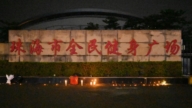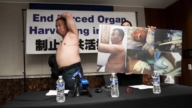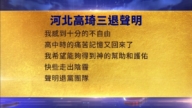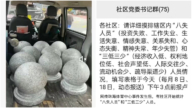【新唐人2013年12月11日訊】一部中國歷史題材的電影《大明劫》,近期熱爆大陸影視評論界。影片講述明朝末年,崇禎皇帝啟用名將、名醫挽救內憂外患、瘟疫蔓延的大明王朝,最後終以失敗告終。評論認為,片中影射了窮途末路的中共政權,警示中共「瘟疫可治,人心難收」。
《大明劫》是由留美海歸人士謝曉東編劇、青年導演王競執導的歷史題材影片。影片描述1642年明朝末年,全國瘟疫橫行,戰亂四起,崇禎皇帝把關在死牢的名將孫傳庭釋放,令他率兵征討農民軍領袖李自成。
《大明劫》10月25號,在中國大陸戲院首映,立即引來了各個影片網站的熱播,北京、廣州和深圳等街頭則出現了DVD版。因片中故事的時代背景與當今中國社會相似,片中情節與人物言行,令觀眾聯想到時下的中共,甚至「對號入座」引起強烈共鳴。
有評論質疑,這樣一部借古喻今,影射中共政權窮途末路的影片,是如何通過電影管理部門審查的?也有評論稱讚創作者高明,把真實歷史和藝術創造巧妙結合,使審查者無可挑剔。還有評論則認為,這部影片通過了中共文宣的審查乃是「天意」。
時事評論員石靜笛:「其實任何朝代在退出歷史舞臺的時候,那個階段社會的狀況,都有很大的相似性的,貪官污吏遍地、嚴刑峻法鎮壓、民不聊生、瘟疫流行等等,所以與其說,這部電影是借古喻今,不如說這是歷史在給現在的上課。」
影片中記述,名將孫傳庭率兵征討農民起義軍,可軍餉不濟,軍營內瘟疫蔓延,軍營外的村民也因為瘟疫幾乎死絕。
當名醫吳又可趕往軍營告訴趙提領瘟疫傳染的原因時,趙提領因在軍中治疫無效,已被「指揮史」殺害。吳又可讓「指揮史」告知全城百姓,大瘟疫將至,務必人人小心。但「指揮史」一聽,勃然大怒,罵道,如此一來豈不軍心大亂。
由於趙提領封鎖消息,隨後軍營中死亡者倍增。網民指出,這像極了2003年中國「非典」疫情爆發時,中共為了粉飾太平,封鎖消息的情形。
影片中還描述,當國庫空虛,錢糧緊缺時,孫傳庭要到「經歷司」查帳,追繳官吏們多年來囤積的錢和糧,但「經歷司」一夜間被一場大火燒掉了,官吏們的收支再無從查起。
網民說,這與中共「巡視組」到地方展開工作,「中儲糧」、「中儲棉」馬上發生大火,如出一轍。
石靜笛:「政權和民眾的關係是『水可載舟亦可覆舟』,但是像暴秦(秦始皇)、中共以及各個朝代末期,官員們如狼似虎的鎮壓百姓、盤剝百姓,所以中共走入暴秦結局,也是它們自己的選擇。」
香港《蘋果日報》指出,這與當今中國社會也十分相似:社會矛盾激化,大規模群體事件此起彼伏,血案冤案不絕。對此,明朝用東廠、西廠,殘酷鎮壓﹔中共則用公安武警維穩。罔顧人權,如出一轍。
前香港《聯合報》文藝類專欄作家張成覺指出,現今的中共社會還不如明朝末期,他說,明朝是私有制,民眾有私有權。
前香港《聯合報》文藝類專欄作家張成覺:「現在的大陸中國它不是私有制的社會,農民是沒有自己的土地的,居民他的住房土地也是屬於國家的,國家隨時可以徵用他的土地以及房子,所以現在很多上訪的就是為了這個問題嘛。」
張成覺指出,中共執政幾十年來,製造大飢荒、大屠殺、文革等,害死八千萬中國人,把經濟搞垮,把傳統文化摧毀,屠殺「六四」學生、迫害法輪功、訪民等,早已民心盡失,明朝的滅亡警示中共:瘟疫可治,人心難收。
採訪編輯/李韻 後製/陳建銘
Movie “Fall of Ming" Alludes to The CCP’s End
“Fall of Ming" is a Chinese history-themed movie that has
recently won over China’s entertainment critics.
The movie portrays the end of the Ming Dynasty when
Emperor Chongzhen ends in failure in his efforts
to save the dynasty from rebellion and an epidemic,
even with the help of capable generals and doctors.
Commentators say the film alludes to the Chinese communist
regime’s going down a dead end, and warns the regime that
pestilence can be cured, but hearts are hard to reconcile.
“Fall of Ming" is a movie directed by Wang Jing
based on a screenplay by Xie Xiaodong.
It takes viewers back to 1642, when the Ming Dynasty
was troubled with rebels and a rampant epidemic.
Emperor Chongzhen released General Sun Chuanting
from death row and had him lead Ming troops on crusade
against peasant rebel leader Li Zicheng.
“Fall of Ming" premiered in China on Oct. 25.
It quickly became a hit on movie websites and a DVD version
was soon available in Beijing, Guangzhou and Shenzhen.
The film’s plot and characters illustrate a historical theme
resembling contemporary Chinese society, making many
viewers think of China today under the Communist Party.
It has thus had a strong resonance with viewers.
Some critics wondered: How did this film with so many
metaphors alluding to the end of the CCP’s regime
get past the review committee in China?
Others commented: It is a clever film combining both
historical reality and artistic creation.
Therefore, it is impeccable to the reviewers.
Some even called it an act of God that the film passed
review by the CCP’s propaganda department.
Shi Jingdi, commentator: “In fact, the period prior to the end
of any dynasty in history share similar situations, such as
widespread corrupt officials, draconian repression,
prevalence of poverty and diseases, and so forth.
The movie is more a history lesson than a simple metaphor."
The movie showed that as Sun Chuanting was on the crusade,
the army lacked funds and then was hit by an epidemic which
spread within the barracks and wiped out nearly all villagers.
When the doctor Wu Youke rushed to the barracks to inform
doctor Zhao Tiling how the disease was transmitted,
he found Zhao had already been killed for failing to find a cure.
When Wu instead informed the commander to warn everyone
about the epidemic, the commander was enraged,
“This will bring chaos to the troops if revealed".
Deaths quickly enveloped the barracks because the doctor
Zhao Tiling blocked the information about the disease.
Many Chinese netizens recalled when the CCP also blocked
news of the SARS outbreak in China in 2003.
The film also described the fact that when the treasury was low
and the land tax was scarce, Sun Chuanting intended to check
the registrar records to retrieve money and food stored by
local governors.
However, the registrar was caught on fire, and the officials』
balance books were burned without a trace.
Netizens compared that to the fire that broke out at a Chinese
grain storage center and a cotton reserve
when the CCP’s inspection teams
were doing local investigations.
Shi Jingdi: “The relationship between a regime and the
populace is like how ‘water can both carry and capsize a boat’.
Like the tyrannical Qin and the CCP, officials have all
repressed and exploited the people at the end of each dynasty.
The CCP is going towards its end is also its own choice."
Hong Kong-based Apple Daily reports that there is a great
resemblance in the social issues as well.
The ever intensified social conflicts and mass protests
have taken place on a large scale, murder and injustice reach
every corner of China today.
While the Ming Dynasty carried out brutal suppressions
through the security and inspection institutes of the East and
West Factories, the Communist regime employs
the public security and armed forces to maintain stability,
with the same inhuman measures.
Former arts columnist for Hong Kong’s United Daily News
Zhang Cheng-Jue says that today’s Chinese society under the
CCP is worse than that at the end of the Ming Dynasty.
He explains that people had private ownership
during the Ming Dynasty.
Zhang Cheng-Jue, columnist: “Today’s mainland Chinese
don’t have private ownership.
Farmers do not own land. Houses belong to the state.
The state can expropriate the land and homes at will.
That’s the reason why there are so many petitioners nowadays."
Zhang Cheng-Jue says over the decades of CCP rule,
manmade famine, massacre, the Cultural Revolution, etc,
have lead to the deaths of 80 million Chinese people.
The economy was ruined, the traditional culture destroyed,
and innocent people such as the July 4th student movement,
the Falun Gong, and petitioners are persecuted and killed.
The regime has lost the support of the people.
The fall of the Ming dynasty is a warning to the CCP:
Pestilence can be cured, but hearts are hard to reconcile.
Interview & Edit/LiYun Post-Production/ChenJianming



























